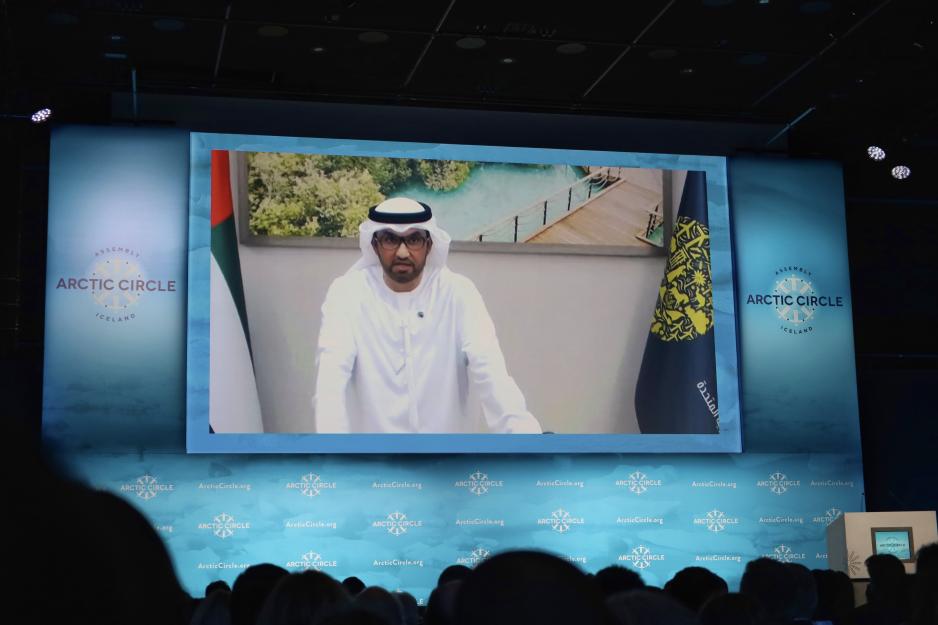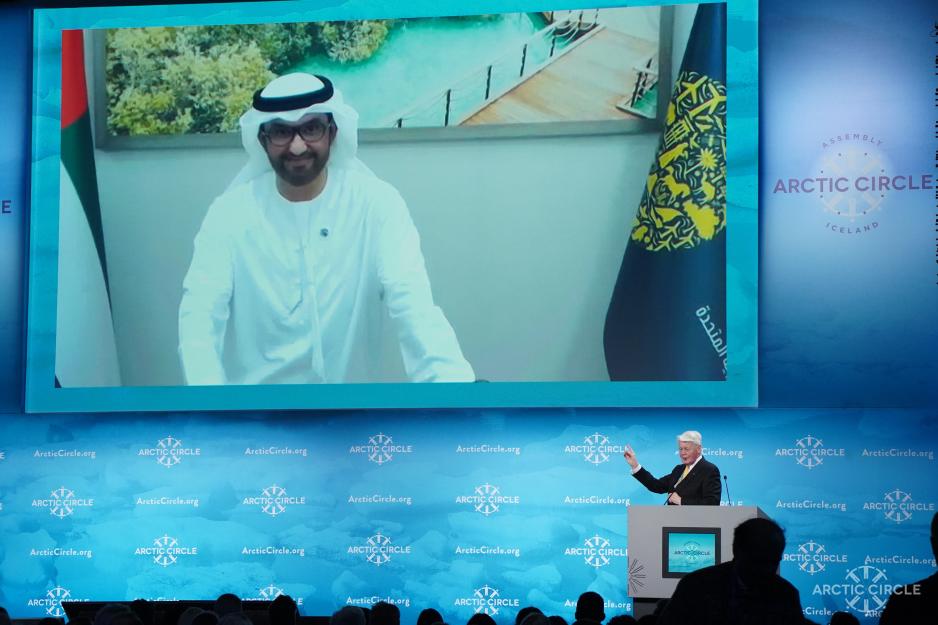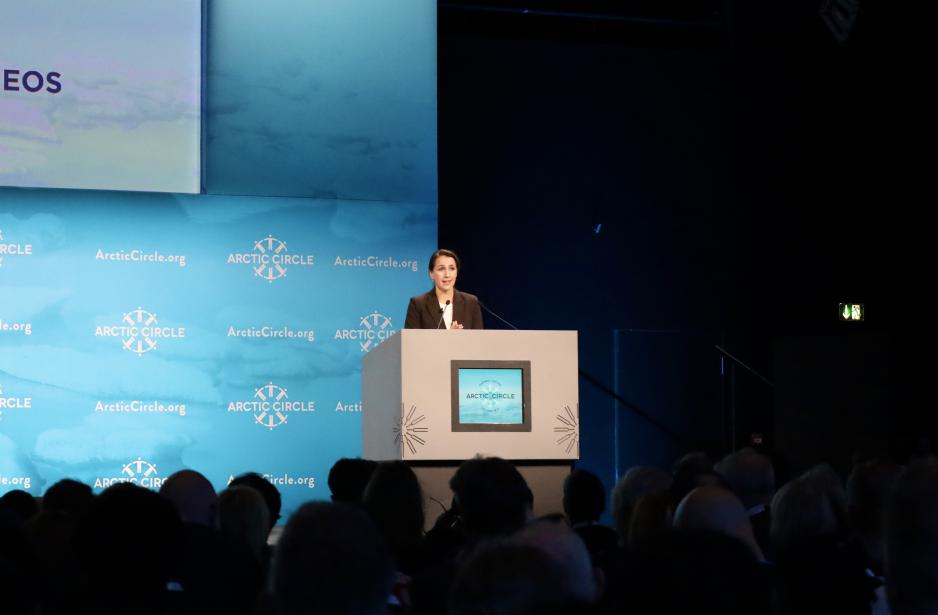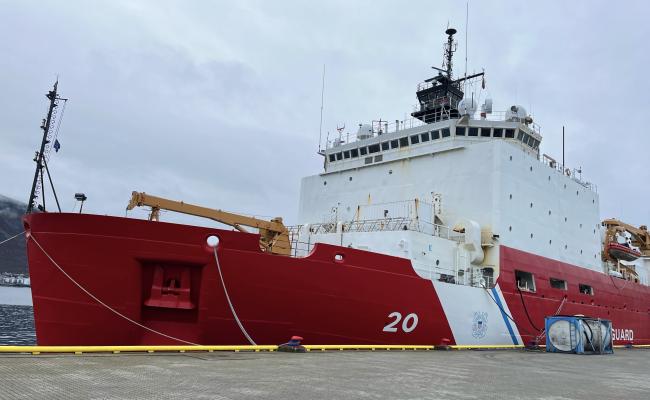The United Arab Emirates at the Arctic Circle: "Past Climate Promises Must Be Upheld"

"The world has a lot to learn from Arctic indigenous people, who have long experience with sustainable management of land and resources," says COP 28 President-Designate Dr. Sultan Ahmed Al Jaber at the Arctic Circle Assembly. He was supposed to participate physically at the assembly but had to speak via videolink as he did not make it to Iceland in time. (Photo: Astri Edvardsen)
Reykjavik (High North News): "The Arctic is the front line of climate change in a very real sense. We must keep our eye on the Polar Star – the 1.5-degree target," says the United Arab Emirates' special envoy for climate and COP 28 President-Designate at the Arctic Circle Conference.
The United Arab Emirates (UAE), a small country in the Middle East, has a significant presence at the Arctic Circle Assembly on Iceland with two ministers.
Their mission is to speak for climate action – something they both did from the stage on the assembly's opening session on Thursday.
In November, the United Arab Emirates will host COP 28 – the UN's annual climate conference.
"There are 41 days left until COP 28, and I consider it extremely important to take this opportunity to speak to this significant assembly. For the past ten years, the Arctic Circle has led the discussion on the effects of climate change on fragile ecosystems in the Arctic," says COP 28 President-Designate Dr. Sultan Ahmed Al Jaber, the UAE's Minister of Industry and Advanced Technology and special envoy for climate.
"This forum has made the world aware of the fact that the Arctic is warming up four times faster than the rest of the planet; that Greenland's ice sheet is losing 280 billion tonnes of mass each year – and that the sea level is rising at a dangerous rate. If only a quarter of the Greenlandic ice sheet melts, it could lead to the ocean rising two meters. This would be devastating – not only for the Arctic region but for coastal communities, lives, and livelihoods across the world.

"It is important that an oil-rich state such as the United Arab Emirates takes the lead on climate efforts. One day we will celebrate the last oil barrel in Abu Dhabi," says Ólafur Ragnar Grímsson, Chairman of the Arctic Circle and former Icelandic president. (Photo: Arctic Circle)
Eye on the Polar Star
Furthermore, the COP 28 President-Designate draws up the big, crucial lines that the Arctic and the world are facing.
"The Arctic is the front line of climate change in a very real sense – and people in the region have also taken the lead to push for actual action. As the recent report from the UN Panel on Climate Change shows, we now have a short window of time to make a massive change in course. The world must agree to cut 22 gigatonnes of emissions for the next seven years to limit global warming to 1.5 degrees," asserts Jaber and continues:
"This is a massive task that requires global action. This is the aim of COP 28: To gather people, companies, and regions from the entire globe for shared efforts in the face of this challenge that affects us all."
"Past climate promises must be upheld. We must keep our eye on the Polar Star – the 1.5-degree target,” he insists.
More specifically, Jaber urges governments to strengthen the funding of both climate measures and compensation for climate damages – as well as to strongly promote new technologies, such as hydrogen production and carbon capture and storage.

"In the face of climate change, intellectual transformation and scaling up renewable energy production is also needed. We have big plans for innovation in this field," says Mariam bint Mohammed Saeed Hareb Almheiri, Emirati Minister of Climate Change and Environment, at the Arctic Circle Assembly. (Photo: Astri Edvardsen)
"The melting of the ice must be stopped"
"Why are we here at the Arctic Circle Assembly? Although the United Arab Emirates is far from the Arctic and we are a young state with our potential for improvement, we see the need for and are committed to climate action. The melting of the ice in the Arctic region must be stopped," says Mariam bint Mohammed Saeed Hareb Almheiri, Emirati Minister of Climate Change and Environment,
The United Arab Emirates consists of seven sheikdoms, which became a state in 1971 when the UK withdrew its military protection obligations.
At the same time as the UAE, like Norway, has built itself on petroleum exports, Almheiri emphasizes its commitment to renewable energy.
"We are opening one of the world's largest solar cell parks and are also developing wind energy – even though we do not have nearly as strong winds as here in Iceland," she points out.
Minister Jaber did not answer questions from the assembly about whether oil and gas states should set an end date for their fossil fuel production. Still, the Climate Change and Environment Minister Almheiri responded with the following to a similar question:
"The fossil sector still has a role to play. Tomorrow's energy systems must be built with yesterday's, and at the same time, we must decarbonize, decarbonize, and decarbonize."




